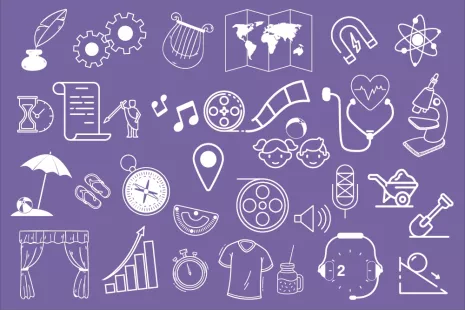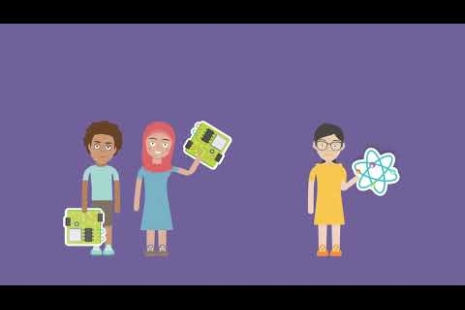If you are about to choose GCSE subjects to study in years 10 and 11, we can help you.
The subjects you choose may affect:
- The grades you will get
- The sixth form or college you go to
- Subjects, courses and qualifications you can do next or later in university
- Apprenticeships you can apply for
- Jobs you can do in the future
Questions you might have
How do I decide which subjects to study?
Making a good decision first time makes things easier.
You're making a big decision so it's important not to rush it. Choose subjects because:
- You are good at them
- You enjoy them
- They suit how you learn best
- They are needed or useful for your career idea
But if you change your mind after you've started a subject, it's sometimes possible to change course if it works with your timetable.
Resources to help you decide
Here are some of our resources to help you start thinking about the best subjects to study:
- If you really enjoy a particular subject, use Subjects on Job Information to explore the jobs it might lead to
- If you have a career in mind, use Job Information to find out which subjects could be useful
- Not sure what subjects or jobs to consider? Try the Buzz Quiz and Career Match Quiz to start exploring ideas
What subjects are compulsory?
Compulsory subjects means that you must take them because they build up the skills you will need in the future, like literacy and numeracy.
You will be taking:
- English
- Maths
- Science
- Welsh 1st Language (Welsh medium schools)
- Welsh 2nd Language (English medium schools)
These subjects are usually studied as GCSE qualifications but they can also be studied at other levels such as Entry Level. Find out about qualifications.
Some schools have other compulsory subjects, for example Religious Education, Physical Education, Welsh Baccalaureate and Information Technology.
English and Maths
These are the subjects most needed for courses and by employers. Do as well as you can in English and Maths to improve your chances of getting a job or onto a course later.
Science
Science will help you understand the world around you, especially as technology advances, and will give you skills like problem solving that you will need in whatever job you do.
Science is needed for many courses and jobs. Check which subjects may be needed for your career ideas in Job Information.
Welsh language
Welsh language skills can give you an advantage in the workplace in Wales, especially in jobs that work with young people, like teaching. Check which industries and jobs need Welsh language skills in Job Information. Find out why employers value Welsh language skills in the workplace.
What are optional subjects?
These are subjects you can choose yourself. Your choice of subjects will depend on your school. Each school will offer a slightly different range of subjects and courses.
Your school will give you a list of subjects to choose from. The subjects could be a mixture of GCSEs and Level 1 and 2 vocational qualifications.
These are just some of the subjects you may be able to choose from:
- Art
- Computer Science
- Drama
- Food and Nutrition
- French
- Geography
- History
- Information Communication Technology (ICT)
- Music
- Physical Education
- Religious Studies
- Construction
- Engineering
- Hospitality and catering
Areas of Learning and Experience
As part of the new Curriculum for Wales all subjects are linked to 6 areas. These are called Areas of Learning and Experience.
They are to help prepare you for the future, to get you ready to learn and be confident individuals.
The 6 Areas are:
- Expressive Arts
- Health and Wellbeing
- Humanities
- Language, Literacy and Communication
- Mathematics and Numeracy
- Science and Technology
Top tips to making decisions
Things you can do to make positive and confident decisions:
Take Decision Making Quiz
Discover your decision-making style by taking our short Decision Making Quiz. Discover what techniques you use now and get tips to improve.
Research
You should:
- Check for information on subjects you can choose from on your school's website or options booklet
- Attend any options evening your school has to speak to teachers and find out more
Listen and consider
You should:
- Listen to advice from teachers, parents and careers adviser
- Consider all options. Be open-minded as there might be choices that you hadn't thought about before
- Make a list of the subjects you are most interested in. Think about the pros and cons of each subject, like the skills you could learn, how you learn best and commitment required
Remember:
Make you own decision. Don't be influenced by others. You are the one who will be doing the lessons, homework and any coursework, assessments and exam. It's important that you chose what's right for you.
Don't choose a subject because your friend is. You might be better at something different and enjoy it more. You might not even be in the same class! It's important that the subject is right for you.
Ask questions
You should ask teachers:
- About the type of work you will be doing, and if there's a lot of writing or if it's more practical?
- If there's an exam at the end or just coursework, or a mix of both?
- If there's a practical or performance element? How much would this count towards your final grade?
Explore your career ideas
Watch the videos
Watch the video to find out more about your subject options
Watch the video to get some tips on how to choose your subjects
What details do we hold and why?
For us to provide our services, it is necessary for us to hold personal data about the people we work with.
To help you plan your future we will hold information which may include:
- Your name
- Home address
- Subjects you are studying
- Exam results
- Any work experience you have done
- Ideas you may have about your future education or career
- Details of any support needs you may have
- Contact details for you and your parent or guardian
We may share and receive personal data about you with and from your school, college, training provider and other organisations that may help you with your future career plans.
We treat personal data with respect. Find out more in our privacy notice.
Contact us
We can help you. We can give you information and advice as you choose your subject. Talk to your Careers Adviser in school or contact us.
We may contact you in a range of different ways to offer help and support, including in person, over the phone, by email and by text. If you do not want us to contact you please tell your careers adviser in school or contact us to let us know.
Find out more
If you would like to talk to us, contact us for more help and support

Get help with choosing subjects and courses. Find out the entry requirements, jobs of the future, career ideas, and your learning style.

Understand qualification levels and why they matter. Learn about qualifications, including NVQs, GCSEs, BTECs, A levels, degrees and HNDs.

The decision you make now can affect your future career path. Make a choice that will help you achieve your career goals.

Are you wondering ‘what skills do I have?’ or ‘what are my strengths?’ Get tips to help you find out.

Explore learning and career options after your GCSE's.

A range of posters to discover careers and skills linked to different subjects.

Learn what jobs are available now and in the future, and what skills employers want.
Information for parents and guardians

Get information, resources, and tips to help your child make career decisions and find out about the support we offer as your child goes from education to employment.



